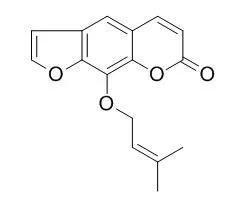| Cell Research: |
| Pharmacol Rep. 2014 Apr;66(2):292-300. | | The effect of quercetin and imperatorin on programmed cell death induction in T98G cells in vitro.[Pubmed: 24911084] | High expression of HSP27 and HSP72 in glioma cells has been closely associated with chemoresistance and decreased sensitivity to programmed cell death induction. Therefore, it is important to devise therapies that effectively target invasive cancer cells by inducing cell death. The aim of our study was to assess the effect of quercetin and Imperatorin applied separately and in combinations on the apoptosis and autophagy induction in human T98G cells cultured in vitro.
METHODS AND RESULTS:
Cell death induction was analyzed by the staining method. The Western blotting technique and fluorimetric measurements of activity were used to assess the expression of marker proteins of apoptosis and autophagy. The specific siRNA transfected method was used for blocking of the expression of HSP27 and HSP72 genes.
The experiments revealed the highest percentage of apoptotic cells after using a 50?M concentration of both compounds. Simultaneous quercetin and Imperatorin administration induced apoptosis more effectively than incubation with single drugs. These results were accompanied with decreased HSP27 and HSP72 expression, and a high level of caspase-3 and caspase-9 activity. Autophagy was not observed. Additional experiments were performed on a cell line with blocked Hsp27 and Hsp72 expression and significant increase the sensitivity to apoptosis induction upon quercetin and Imperatorin treatment was noticed.
CONCLUSIONS:
The present study indicates that quercetin and Imperatorin are potent apoptosis inducers, especially when they act synergistically, which may be a promising combination useful in glioma therapy. Our results also demonstrated that blocking the HSP27 and HSP72 gene expression might serve as a therapeutic target for the human brain cancer. | | Pharmacol Toxicol. 2002 Jul;91(1):40-8. | | Imperatorin, a furanocoumarin from Angelica dahurica (Umbelliferae), induces cytochrome c-dependent apoptosis in human promyelocytic leukaemia, HL-60 Cells.[Pubmed: 12193260] | Imperatorin, a biologically active furanocoumarin from the roots of Angelica dahurica (Umbelliferae), was found to induce apoptosis in human promyelocytic leukaemia, HL-60 cells.
METHODS AND RESULTS:
DNA fragmentation assay, morphology-based evaluation, and flow cytometric analysis demonstrated that Imperatorin at micromolar concentrations was able to trigger apoptosis of HL-60 cells. Neither necrosis nor differentiation was observed at cytotoxic micromolar concentrations of Imperatorin. Further studies showed that the cytochrome c/caspase-9 pathway was responsible for Imperatorin-induced apoptosis; i.e., mitochondrial membrane was depolarized, Bcl-2 was down-regulated, cytochrome c was released from mitochondria, caspase-9 and caspase-3 were activated, and poly(ADP-ribose) polymerase was cleaved. Furthermore, Imperatorin-induced apoptosis was significantly blocked by Z-VAD-FMK (a broad spectrum caspase inhibitor), Z-LEHD-FMK (a caspase-9 inhibitor) and Ac-DMQD-CHO (a caspase-3 inhibitor), but not by Z-IEDT-FMK (a caspase-8 inhibitor). |
|






 Cell. 2018 Jan 11;172(1-2):249-261.e12. doi: 10.1016/j.cell.2017.12.019.IF=36.216(2019)
Cell. 2018 Jan 11;172(1-2):249-261.e12. doi: 10.1016/j.cell.2017.12.019.IF=36.216(2019) Cell Metab. 2020 Mar 3;31(3):534-548.e5. doi: 10.1016/j.cmet.2020.01.002.IF=22.415(2019)
Cell Metab. 2020 Mar 3;31(3):534-548.e5. doi: 10.1016/j.cmet.2020.01.002.IF=22.415(2019) Mol Cell. 2017 Nov 16;68(4):673-685.e6. doi: 10.1016/j.molcel.2017.10.022.IF=14.548(2019)
Mol Cell. 2017 Nov 16;68(4):673-685.e6. doi: 10.1016/j.molcel.2017.10.022.IF=14.548(2019)